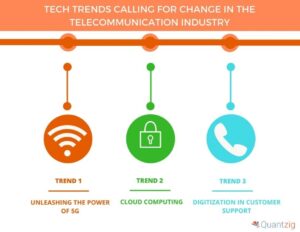From Telcos to Techcos
The telecommunications landscape has been ever-changing since the emergence of the competitive operators’ market in the 1980s. While traditionally players in this market have been known for providing their network services and infrastructure, nowadays, many telco operators are reporting a decrease in average revenues per user under these segments, which led to investors shying away. This new dynamic is mostly due to the diversification of consumer needs in the now technologically driven ecosystem, and telco players are not letting this golden opportunity pass by.
The global abundance of tech is slowly but surely creating a new type of players in the industry, often referred to as Techcos. These players seek to differentiate their offerings, by providing tech-based products and services such as artificial intelligence (AI) analytics, Internet of Things (IoT), network automation, cloud…etc.
Opportunities
There are many positive outcomes that come with the diversification of telco players’ offerings into techs, such as performance improvement, a competitive edge in big data, and new revenue streams.
New systems and tools such as IoT, data analytics, and cloud help players across the telecom industry reduce costs and cut down on resource waste. Furthermore, many jobs in the telecommunications industry can benefit from utilizing software services to improve their processes, such as technicians, line installers, and media providers. This entails the use of new technology to automate systems and increase performance for the tasks in question.
Another opportunity that results from the shift to Techcos is the utilization of cloud technology specifically, which can help telco providers in delivering better and faster services to both channels (businesses and consumers). These new digital services can include the use of AI and machine learning (ML) infrastructures to increase the performance provided. This feature of the combined use of data and AI is unique to the emerging Techco players, who are already experienced at handling large-scale data, thus giving them a differentiating edge over their major cloud vendors/other tech competitors.
Finally, 5G technology opens a new major revenue stream in digitization and the IoT market, which offers ground for new businesses and business models to develop and grow. The latter will see the telco players as more than just network providers but a digital marketplace that offers the possibility to monetize assets. This new segment has shone a light on the future of telcos, which would have been otherwise bleak had they continued to remain only a connectivity provider.
Risks
On the other hand, there are also challenges to the launch of telco players in ICT services, such as some players’ choice of the wrong approach, the obstacle of converting to customer-centric solutions, and the building of efficient partnerships.
One of the key downsides is for players who chose to dive into the tech industry too quickly. Many have attempted to hastily convert their traditional services and offerings into the cloud, expecting to meet their customers’ needs. However, these players have underestimated the various complex aspects of this transition, which resulted in them incurring higher than expected costs. As they later discovered, the most effective approach for this transition is to use a hybrid model that encompasses aspects from both the traditional and new models.
While the shift to digital offerings opens a new market for these telco players, such as the possibility of IoT solutions. Techcos must seek to become more than just commodity connectivity providers. The challenge is not to offer the fastest or most reliable network, but to become a solution provider, which entails a sense of “digital empathy” for their clients. This is to say that to achieve the desired results the shift must occur in a comprehensive manner that allows for the adoption of a new operating system, which considers all elements – from connectivity to infrastructure, to user security and customer-focused services.
Finally, this transformation requires the players in the industry to become a sort of “one-stop-shop” for both B2B and B2B2C channels, thus taking on the responsibility that was once undertaken by ICT players who traditionally developed the tech used for the telco network. This shift, therefore, calls for partnerships and investments in both automation and the workforce in this field.
COVID-19 Impact
The digitalization of the telco market, which is a feature of the Fourth Industrial Revolution (Industry 4.0), has been sped up due to the COVID-19 pandemic. This is because of the highlighted need for a global digital transformation, consequently showing the potential for telcos to gain new streams of revenues.
The COVID-19 outbreak has highlighted the fact that the telco industry is on the front lines of the world economy. Telco players are therefore aiming to keep the community connected and to ensure continuity in business operations during and after the pandemic. It also shows that advanced technology such as AI and 5G are critical to delivering solutions and platforms that can help navigate the pandemic.
The cloud-computing segment, which was already gaining increasing popularity, has also become a catalyst of growth for telcos thanks to the pandemic. The flourishing demand for collaboration, remote work, and SaaS applications is helping companies profit from the surge of digital transformation.

Use Cases: MTN and Vodafone
One of the leading examples of this shift can be seen in Africa’s biggest telco company MTN. This player announced its rebranding into a technology company in February of 2022. The shift also involves a logo change that is part of MTN’s newly adopted “Ambition 2025” strategy, aimed at providing “leading digital platforms for Africa’s progress”. The new-look is “aligned to our evolution from a telecommunications company to a technology company underpinned by one simple and consistent yet striking brand”, said Nompilo Morafo, MTN Group Chief Sustainability, and Corporate Affairs Officer.
Vodafone on the other hand started developing a new technologically backed value proposition that relies on the use of IoT, 5G, and edge capabilities. Its efforts to become more than just a telco revolves around the digitalization of its customer experience, services, and business operations. During its 2020 industry analyst summit in London, which was intended for its Vodafone Business segment, it announced that around 60% of its core IT has been moved to the cloud. Moreover, the company has adopted a digital-first approach within its business and overall culture, which spans across its departments, from marketing and customer management to platform and solution development.
The telecommunication industry is witnessing a shift in its landscape as telcos are beginning to build and offer tech-like products. While this new market offers many opportunities – such as automated systems, a competitive edge in data manipulation and additional revenue streams – the companies’ success depends on their capability to adopt the correct approach for the shift, offer customer-centric solutions, and build efficient partnerships. When done correctly, the transition of telco players into Techcos is a new source of growth that cannot be overlooked.
Sources:
- Telco to Techco – Telecoms Europe Events
- From Telco to Techco (workpath.com)
- Vodafone idea: ‘From Telco to a Techco’: Enterprise business to catapult telecom industry to next level, Telecom News, ET Telecom (indiatimes.com)
- From telecoms to tech: MTN changes logo to look the part | TechCabal
- A Technological Shift in Telecommunications – Programming Insider
- Why telcos need to become ‘Techcos’ – TechCentral
- The Telecommunications Service Provider Journey – From Telco to Techco – Cloudera Blog
- Telco Vs Techcos – a Battlefield for the Future of ICT – IT News Africa – Up to date technology news, IT news, Digital news, Telecom news, Mobile news, Gadgets news, Analysis and Reports
- Vodafone Business: from telco to tech comms
- How has COVID-19 influenced the telecoms industry so far? – Telecoms.com
You may also like
Warning: Undefined variable $content in /var/www/sdomains/nexatestwp.com/infomineo.nexatestwp.com/public_html/wp-content/themes/infomineo/single.php on line 235
Warning: Undefined variable $content in /var/www/sdomains/nexatestwp.com/infomineo.nexatestwp.com/public_html/wp-content/themes/infomineo/single.php on line 235
Warning: Undefined variable $content in /var/www/sdomains/nexatestwp.com/infomineo.nexatestwp.com/public_html/wp-content/themes/infomineo/single.php on line 235
Warning: Undefined variable $content in /var/www/sdomains/nexatestwp.com/infomineo.nexatestwp.com/public_html/wp-content/themes/infomineo/single.php on line 235
Warning: Undefined variable $content in /var/www/sdomains/nexatestwp.com/infomineo.nexatestwp.com/public_html/wp-content/themes/infomineo/single.php on line 235
Warning: Undefined variable $content in /var/www/sdomains/nexatestwp.com/infomineo.nexatestwp.com/public_html/wp-content/themes/infomineo/single.php on line 235








